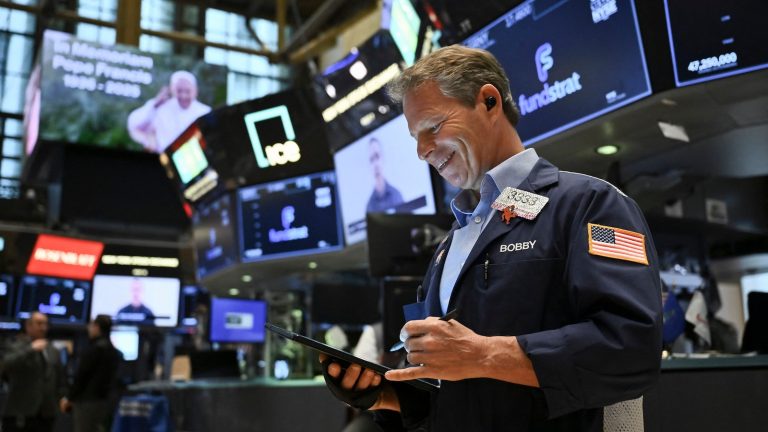U.S. stocks closed significantly lower on Monday as President Donald Trump escalated his criticism of the Federal Reserve, urging the central bank to immediately lower interest rates and questioning the policy approach of Fed Chair Jerome Powell.
The comments came days after Trump said he was eager for Powell’s “termination” despite a longstanding norm of political independence at the central bank.
The Dow Jones Industrial Average closed down 971 points, or 2.4%, while the S&P 500 fell 2.3%. The tech-heavy Nasdaq declined 2.5%.
The price of gold climbed to a record high of more than $3,400 per ounce on Monday, extending gains achieved in recent weeks as investors have sought out investments perceived as safe havens.
A renewed selloff hit the U.S. bond market, however, triggering concern among some investors about continued volatility in an investment typically thought of as one of the most reliable. The yield on 10-year Treasury bonds remains below a high attained in the aftermath of Trump’s “Liberation Day” tariff announcement, but it stands well above its level at the outset of April.
Last week, Powell voiced alarm about Trump’s tariff policy, saying it would likely hike inflation and slow economic growth. Powell indicated that the Fed may approach interest rates with restraint as policymakers observe the economic effects of Trump’s tariffs.
In a social media post on Monday, Trump dubbed Powell “Mr. Too Late” in reference to a policy approach that Trump views as overly cautious.
Trump warned of the possibility of an economic slowdown “unless Mr. Too Late, a major loser, lowers interest rates, NOW.”
In addition, Trump claimed without evidence that interest rate cuts enacted by the Fed last year had stemmed from an effort to “help Sleepy Joe Biden, later Kamala, get elected.”
Since Powell became Fed chair in 2018, he has repeatedly affirmed the Fed’s political independence. The Fed is an independent government agency established by Congress.

Federal Reserve Chair Jerome Powell speaks at the Economic Club of Chicago, April 16, 2025.
Kamil Krzaczynski/AFP via Getty Images
In November, days after Trump’s election victory, Powell struck a defiant tone when asked whether he would resign from his position if Trump asked him to.
“No,” Powell said, pausing to let the one-word answer register with the reporters assembled at a press conference at the Fed headquarters, blocks away from the White House.
When asked whether Trump could fire or demote him, Powell responded: “Not permitted under the law.”
Powell last week raised the possibility of what economists call “stagflation,” which is when inflation rises and the economy slows.
If the Fed raises interest rates as a means of protecting against tariff-induced inflation under such a scenario, it risks stifling borrowing and slowing the economy further, experts previously told ABC News.
On the other hand, experts said, if the Fed lowers rates to stimulate the economy in the face of a potential slowdown, it threatens to boost spending and worsen inflation.



